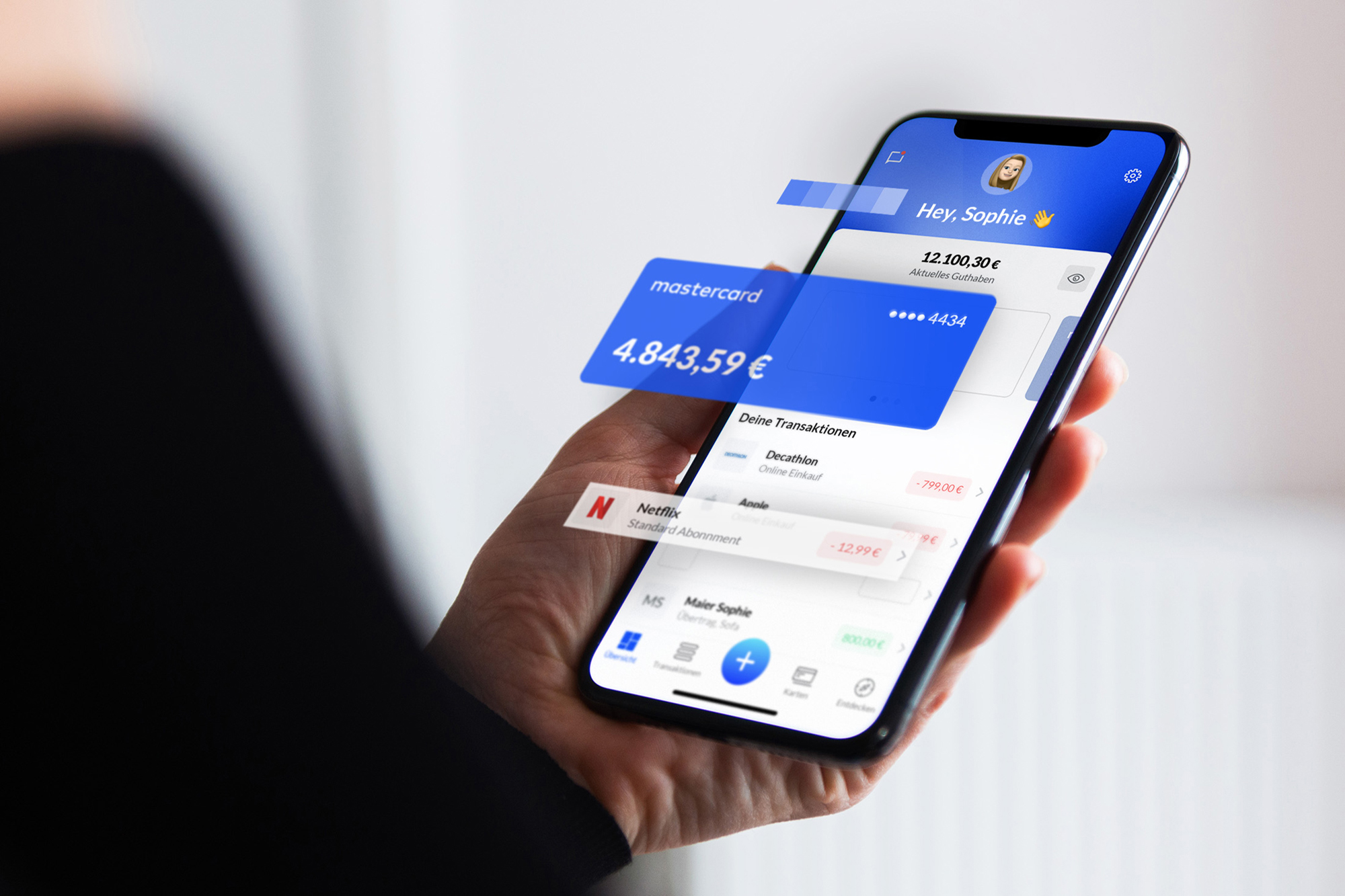About pockid
Founded in 2020, pockid GmbH is Germany’s first neobank to offer Generation Z a bank account with a debit Mastercard.
The company aims at developing a holistic financial solution that enables young people to pay, save and fulfill their aspirations. In order to achieve this goal, pockid currently offers a bank account, a banking app and a virtual and physical debit card.
USP of pockid

Mr. Hennig, before founding pockid you worked in various banking institutions. How did you come up with the idea for pockid?
Prior to pockid, I had worked in the banking sector for a long time and had been able to deal with different acquisition strategies in several positions at Commerzbank, mBank and JP Morgan. This experience revealed that the biggest problem in retail banking was family banking.
My insights into the U.S. market then laid bare that there is a strong need for banking services for younger generations and that the business model can also work successfully. Relevant elements of successful players included reaching out to young people through social media, such as TikTok, Instagram and Discord, as well as an educational approach to solving young people’s financial problems.
Since no player in Europe offered such a solution at that time, I decided to found pockid with my co-founders Max, Timo and Deepankar. Initially, however, we wanted to position ourselves as a PSD2 open banking integration platform and then, after a pivot, we launched pockid as a neobank.
How does pockid differ from the offerings for young people from traditional banks and other neobanks?
Communication is by far our most important differentiator. Our communication strategy focuses exclusively on the target group of 14- to 24-year-olds. We are clearly present on their channels and media and try to communicate our added values in such a way that young people can pitch the idea of opening a bank account with pockid to their parents on their own.
In terms of content, of course, we also offer several advantages. For example, our banking app is much more interactive and allows for tracking expenses in real time. Parents can track their children’s payments via a web-based dashboard, configure the debit card and freeze it, if necessary. At the same time, it is possible for young people to better understand their spending habits through automated and smart classification and to become more aware of them through an educational content approach. We also offer peer-to-peer payment options, which is brand new for young people.
What added value does pockid offer your customers’ parents?
We exclusively focus on the Gen Z target group. This holds true for our USP[1] as well as the already mentioned communication.
However, pockid also offers added value for parents, as they can track their children’s spending in real time. This overview can, for example, create insightful discussions between parents and children that improve their communication as well as awareness of banking and finance issues. Additionally, the pockid debit card can also be used abroad, which is not the case with a traditional debit card.
BankingHub-Newsletter
Analyses, articles and interviews about trends & innovation in banking delivered right to your inbox every 2-3 weeks
"(Required)" indicates required fields
Banking for the needs of Gen Z
Typically, banking offers for young people include major discounts, so typical bank customers do not become profitable until they reach middle age. What is pockid’s business model in this regard?
Traditionally, neobanks have three primary sources of income: account management fees, interchange [fee][2] and partnerships. We want to prioritize the latter.
pockid focuses on young people from Generation Z. What happens to customers once they have passed the age of 18 or 24?
Our goal, of course, is to retain our customers. Market figures show that banks retain their customers over a period of 10 to 20 years.
Market figures show that bank customers have a retention period of ten to 20 years. The so-called main bank model is still present on the market.
After the age of 18, the account remains completely the same for users, from the IBAN to the debit card. So far, the only thing that changes is that the account is being transferred to a standalone account without the interference of the customers’ parents.
Currently, we completely focus on the needs of Gen Z, but in the coming years we would like to further expand our offer (for example, in supporting the purchase of real estate).
The example of Greta Thunberg shows that climate protection is highly important, in particular for young people. How do you plan to incorporate climate protection and sustainability into your company?
The target group of pockid, i.e. Gen Z, is the first generation that has grown up with the buzzword “sustainability”. Greta Thunberg has socialized this term in a very different way and has changed our perception of it. Sustainability is therefore also very important, yet it is a very complicated topic for us as a neobank, as it affects many elements of the value chain that are outside our control.
This means, sustainability is also relevant for pockid, but it is not our first priority, especially since the topic is often misused for greenwashing. We clearly focus on the development of an offer for Gen Z and, accordingly, targeted communication.
According to the press you are striving for creating added value in the areas of “social commerce” and gaming in the future. What developments and future offerings are on your agenda right now?
The variety of trends provides for a lot of new offerings for pockid. To this end, we have identified various opportunities for development. These arise particularly in the areas of gaming, sharing economy (with e-scooters, for example) and creator economy (social media has generated a massive wave of creativity among Gen Z here). These new offerings can then be integrated through partnerships and embedded services.
Future plans of pockid
Do you have plans to expand into other countries? Are there any differences in needs among different countries?
The vision at pockid is clear: offering Generation Z the most advanced banking product. Thus, our company does not focus on geographic markets, but a generation. We want to address this generation across Europe. Therefore, we mostly communicate with our customers in English through various channels.
Of course, with so many different cultures and languages accumulated in a relatively small area, the European market poses some challenges. Nevertheless, the needs and digital hobbies of young people are very similar in all countries and even (almost) at global level. Thus, pockid’s solution addresses Gen Z in every country according to the “one product fits all” principle.
Thanks for the interview. We wish you and pockid all the best for the future.



